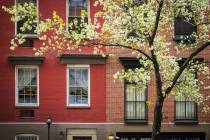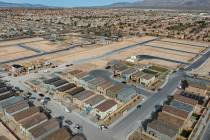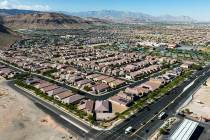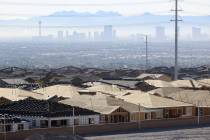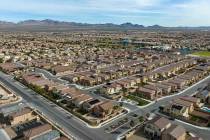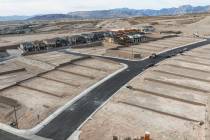HUD delivers a dud
Nevada's congressional delegation demanded answers Thursday after the Las Vegas Valley did not receive a penny of nearly $2 billion in federal stimulus money aimed at helping areas most affected by the nation's housing crisis.
Even though Southern Nevada has one of the highest foreclosure rates in the country, the U.S. Department of Housing and Urban Development denied the region's request for help in placing families into hundreds of vacant, bank-owned homes. Clark County, North Las Vegas, Henderson, and Las Vegas officials asked for $367 million, or one-fifth of the grant dollars available for the entire nation.
Senate Majority Leader Harry Reid, D-Nev., released a statement that he was "extremely disappointed."
"HUD has indicated that the applicants in Southern Nevada did not meet eligibility requirements but the agency needs to explain why," Reid said. "And, given the severity of the foreclosure crisis in Southern Nevada, HUD needs to work with the state to provide needed resources to confront it."
Reid said he has asked for a meeting with HUD Secretary Shaun Donovan.
Rep. Dina Titus, D-Nev, wants to know why an area that is "ground zero for foreclosures" got shut out of funding, Titus spokesman Andrew Stoddard said.
HUD spokeswoman Melanie Roussell declined to explain why Southern Nevada was not awarded any money, but she said the extent of an area's foreclosure problem was only one of the criteria used to score grant applications. Other factors, she said, included the applicant's capacity to manage housing programs and its ability to leverage local or private dollars to combine with the federal funding.
"I can't speak specifically to that application," Roussell said. "The process was a competitive process to recognize need and reward capacity."
The grant awards announced Thursday came months later than expected. They are for implementing the second phase of the Neighborhood Stabilization Program, a HUD initiative to make use of now-empty foreclosed homes.
While Southern Nevada was denied money, the Reno Housing Authority received $21 million to address a foreclosure problem that, while bad, does not rival the crisis in Clark County, where more than 1,600 homes fell into foreclosure in December alone, according, to county Assessor data.
Other recipients nationwide included housing agencies in Florida, which shared $348 million, and in California, which shared $318 million, HUD reported.
The first part of the Neighborhood Stabilization Program, a $4 billion initiative launched during the Bush administration, brought $64 million to the valley last year. That money is being used to acquire foreclosed single-family homes for future home ownership and for use as affordable rental units. Neighborhood stabilization grants cannot be used to help homeowners avoid foreclosure.
HUD officials hinted that the slow pace of spending those first funds is one reason Southern Nevada was denied in the second round, local officials said. Those same officials called the excuse flimsy because other areas, which received grants Thursday, are spending first-round funds no faster. Southern Nevada agencies have bought several dozen homes with those funds.
Southern Nevada officials had been confident a much bigger windfall would come in the second phase of the program because it was a competitive process based on need.
"I am a little perplexed by the decision," said Michael Pawlak, manager of the county Community Resources Department, which oversaw the grant application. "I thought we had a strong application and a strong demonstration of need."
County Commission Chairman Rory Reid, a Democratic candidate for governor, late last year said during a television interview that he believed the area would get the $367 million. He could not be reached for comment Thursday.
Commissioner Lawrence Weekly, whose district would have benefitted from grant money, said he is shocked that Southern Nevada did not get any.
"I am so disappointed because of the simple fact that thousands of Nevadans have lost out on a wonderful opportunity," Weekly said. "We have to roll up our sleeves, get together with HUD and find out what happened."
HUD received 482 grant applications, requesting a total of $15 billion. Only 56 applications were funded. HUD Assistant Secretary Mercedes Marquez is scheduled to meet with local housing officials today, but it is unclear whether she will provide further explanation as to why Southern Nevada's wasn't funded.
The news also upset Las Vegas Mayor Oscar Goodman.
"It's a slap in the face. It defies logic," Goodman said. "We're the poster child for economic woe at this time."
He added, "Only a moron wouldn't know how much we needed the money. It's inexcusable. It makes me sick. It seems like every other city in the country got money except us."
Jeremy Aguero, principal with Applied Analysis, a Las Vegas-based financial consulting firm that helped prepare the grant application, said the region's economic recovery will take longer without the federal money to help fill bank-owned homes.
"The idea behind the Neighborhood Stabilization Program is to help communities disproportionately affected by the housing crisis. ... The recovery is going to be longer and made more difficult," Aguero said. In North Las Vegas, where one in 12 homes is in foreclosure, the failure to get grant money is difficult to accept, said Mayor Shari Buck.
"We are at the epicenter of this devastating storm," she said. "I don't know how that kind of decision can be made. It must be a mistake."
Sue Lowden and Danny Tarkanian, two Republican candidates running this year against Harry Reid, seized on HUD's decision to accuse Reid of failing to serve his constituents.
"Someone has dropped the ball, clearly," Lowden said.
Review-Journal writer Alan Choate contributed to this report. Contact reporter Alan Maimon at amaimon@reviewjournal.com or 702-383-0404. Contact reporter Frank Geary at fgeary@reviewjournal.com or 702-383-0277.








